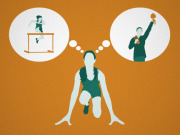Pop psychology tells us we can't go wrong with positive thinking. But new studies show that taking account of our obstacles is essential to success. . .
Research and publish the best content.
Get Started for FREE
Sign up with Facebook Sign up with X
I don't have a Facebook or a X account
Already have an account: Login
This is an online magazine by Bovee & Thill, authors of the leading textbooks in business communication and business writing, published by Pearson, featuring resources about teaching business communication and workplace issues. For more information about Bovee & Thill texts and the exclusive, superior coverage they give to workplace issues, visit their blog: http://blog.businesscommuniationnetwork.com. For instructor examination copies, go to http://blog.businesscommunicationnetwork.com/texts. To find your local sales representative, go to http://www.pearsonhighered.com/educator/replocator. To contact the authors, use this form: https://businesscommunicationnetwork.com/contact-us/. To get a free Comprehensive Guide to Business Communication Instructional Resources, visit http://blog.businesscommunicationnetwork.com/resources. Subscribe to a free weekly newsletter of new posts to all 11 of Bovee & Thill's Online Magazines: http://sco.lt/8kgeVV.
 Your new post is loading... Your new post is loading...
 Your new post is loading... Your new post is loading...
No comment yet.
Sign up to comment
|

Slavica Bogdanov's comment,
June 6, 2012 10:51 AM
Totally agree!! A great article. Love it and I am happy to read it:)
|































